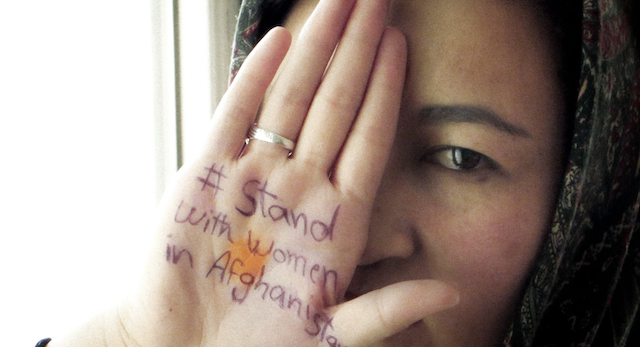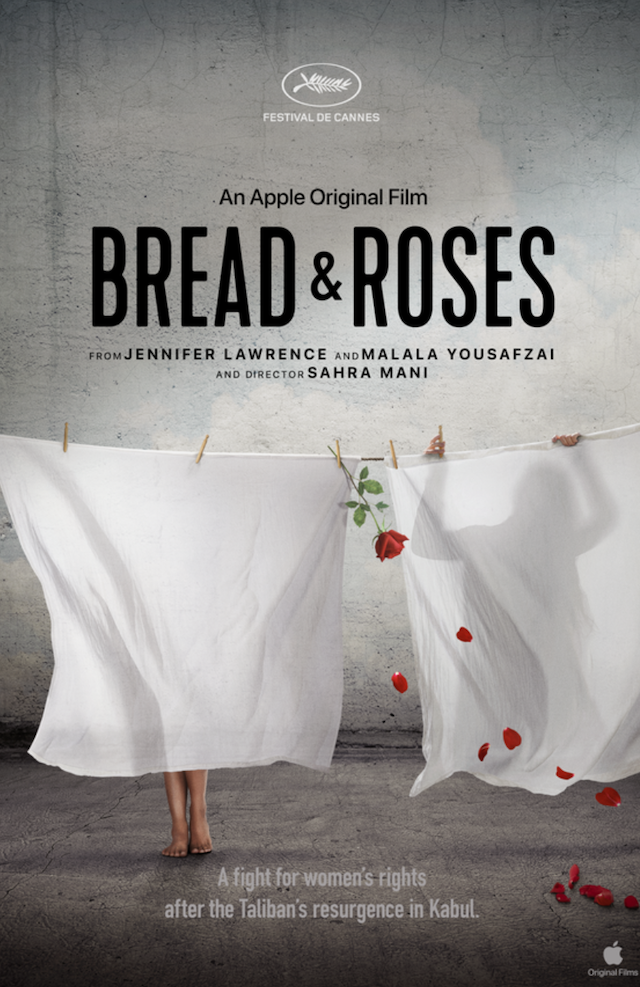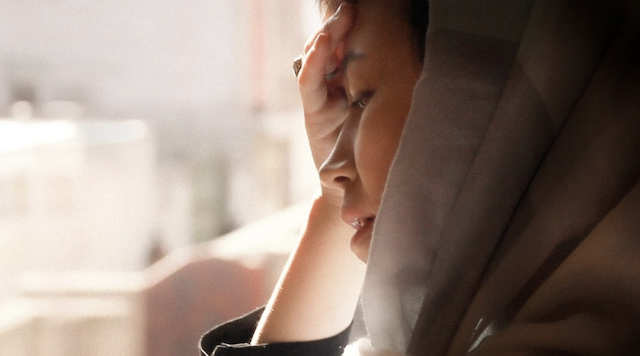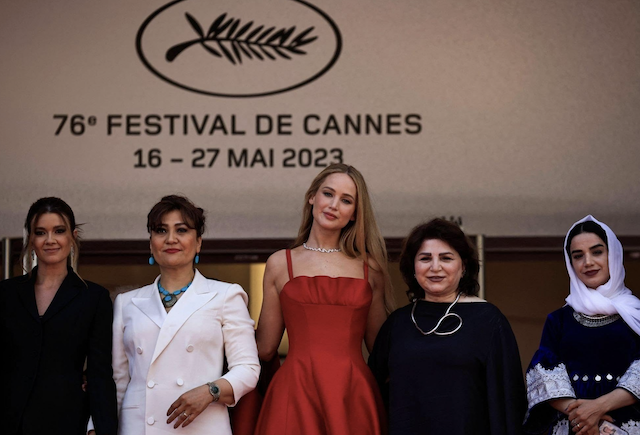

©Courtesy of Apple Original Films
Q : Let me start off with you, Sahra. Taliban entered Kabul on August 15th, 2021. When did you decide to tackle this project and filming those brave women?
Sahra Mani: A few days before the Taliban arrived in Kabul City, I left Kabul to attend the festival in Europe. When this happened, I was at a film festival outside the country. But immediately after that, I was thinking of doing something for the women I knew. And I knew that there are so many women, they were the only breadwinner of their family and they lost their job and they fed their children too.
So that’s how I started working with the charity to support them. Through those charities, I met so many women. They started sending me a video about their daily life. And also they are going to the streets and do demonstrations against the Taliban. When Jennifer Lawrence expressed willingness to support this project, then we built a team on the ground, training our protagonists to have a camera woman, camera man completing our team to work on this film. So, we select several protagonists and then we train them how to film their life in a more intimate way.
Q : I see. Malala, you have been fighting for the Taliban for quite a long time, and I know your father was running a local girl school, and obviously you are growing up in a circumstance where education is very important. So what element of this film speaks to you that gets you involved in this project?
Malala Yousafzai: I Feel very lucky I survived the Taliban attack, and I was able to continue my activism, finish my school as well and advocate for girls education globally. But I did not know that in 2021, the Taliban would take over Afghanistan once again and they would start imposing their severe restrictions on women and girls.
I was in complete shock, because Afghanistan right now is the only country in the world that bans girls from access to secondary education, and it also bars women from any presence in public life or political life. This is in effect, gender apartheid, where women are systematically erased from public life.
For me, what is really important for us to do right now is bring Afghan women’s stories to the center, to our screens, to our conversations. This documentary gives us an opportunity to do that. When I came across the news about this documentary, and I saw an early version I immediately said yes to working with Sahra and Jennifer Lawrence to make sure that we spread the stories of these Afghan women and bring attention to what’s happening in Afghanistan.
Q : Malala, You have been critical of U.S. military action in Pakistan, I believe it’s like 2013, when you met the President, Barack Obama, you call for to end the U. S. drone strikes, and since then, America also withdraw the troops in Afghanistan because you probably were concerned about the vicious cycle of war, eye for an eye, that kind of situation. So what kind of expectation do you have with a current president, we had a newly elected president, Donald Trump. So could you talk about your expectations from the American government?
Malala Yousafzai: I think it’s too early to say anything at this point, but what I really hope for next months and years is that we center Afghan women and girls in any conversations that determine their future. What has been shocking is that these talks are happening with the Taliban. All of these different country representatives are coming together, but Afghan women are excluded from those rules. So, in terms of us, it’s very simple, firstly, there should be no compromise on the rights of women and girls.
We need to make sure that we stand by our commitment to gender equality. Secondly, Afghan women and girls have to be in the rooms where decisions about their future are made. So I just want to highlight those two.

©Courtesy of Apple Original Films
Q : What scares me about this circumstances that not just going to school or not having any education, but also undermine or killing even having a certain dream, but the film also shows a little bit hope side like they have a party scene, the people teaching the kids in a home. So could you talk about what they do to motivate or be positive with those oppression of circumstances that they have.
Sahra Mani: This film had a lot of challenges. For example, one of the challenges was the logistical part of how it is possible for us to transfer the material from Afghanistan out.
Plus we have to train our team in difficult locations. And also be in contact with our team in different Zoom times, like from U. S. to Europe, to Pakistan, to Afghanistan, to Iran, to keep continuing talking and discussing everything around the field. So, the challenge was more than that.
The challenge was that we were facing the human story of loss, resilience. And of course, I hope that we were facing the women that are in the front line and fighting with one of the most dangerous terrorists in the world, that they took the country and took all basic rights from them.
But we never said that we would end up with a deep human story while we were working on this project. What was very important for us during this process was the hope and the resilience that Afghan women have every day to fight back until they get what they want and what they deserve to have.
Q : And the woman. After the Taliban controlled the country, women weren’t allowed to go back to the job, not able to have an extra income. So how those people try to make ends meet. And I see some people providing food on the streets in the film, could you talk about the survival of their daily lives out there.
Sahra Mani: Taliban receive financial support from the international community in the name of humanitarian aid. But because poverty is increasing every day and people become poorer and poorer, we don’t know how they spend the money. But it’s definitely not going to support Afghan people because even in the first year, the first few months when Kabul collapsed, we were witnessing poor families selling their own children to buy food and survive.
And the news went viral, the poverty was really putting pressure on families and especially women who were not allowed to go out and work. That’s all pressure and the difficulties pressure on the women, especially to go out and protest and ask for their rights.
Q : I’m curious to know more. You’ve been concerned about female rights in the Middle Eastern countries for a long time. What are the drastic measures or some approach that we need to take as a U.S. citizen? Because, as much as we wanted to help out, what are the things that we need to do to help them out.
Malala Yousafzai: I think One of the best ways is to know more about what’s happening in Afghanistan. A lot of people are not fully aware of the situation there and that’s why this documentary is critical, Personally, it’s not just telling us about the history and politics of it, but it’s giving the mic to women themselves, to tell us what exactly they’re going through. I do believe that we can hold our representatives and leaders accountable for their commitment to gender equality and push them to do more.
There’s one campaign that is happening right now that is led by Afghanistan women that is asking for the codification of gender apartheid in the crime against Humanity Treaty. That conversation is going on at the UN right now asking member states to open the Crime Against Humanity Treaty to negotiations.
And to codify gender apartheid, and recognize what the Taliban are doing in Afghanistan as gender apartheid and hold the Taliban and those who are complicit in this normalization with Taliban accountable. At the same time we have other opportunities as well.
And that includes supporting Afghan women led or focused organizations that are operating outside the country but also within the country as well. For instance, Malala Fund is supporting charities in Afghanistan, running secret schools for girls or providing education through alternative learning platforms like laptops.
At the same time, we’re supporting Afghan women activists leading this campaign to raise awareness to what is happening and at the same time really central women’s voices, which is really shocking. Women’s and girls rights are at stake, where women are systematically oppressed. At the same time their inclusion and conversation around their rights is not where it’s needed.

Photo by Valery Hache, ©Courtesy of Apple Original Films
Q : For those Afghanistan women when they engage in protest activity. And get arrested, and their father or maybe even like a grandfather would say to them that you brought shame on the family. Was that tough for Afghanistan women too, not necessarily getting the support from their family, I’m pretty sure they are concerned about their daughter or, granddaughter, but at the same time, it’s quite a difficult situation for family perspective, so could you talk about a dynamic in a household when they dealing with activist approach.
Sahra Mani: We know that Taliban are really dangerous and we have recognized them as international terrorists for many years. So, when the girls and women, they are going out and doing demonstrations. We were witnessing so many kidnapping, arresting, killing, torturing happening. And because of stigma in my society, women are not able to tell exactly what happened to them in prison. If they open up and take about all the torture that happened in prison, they might lose their family and society too,
They are fighting in tough situations. Imagine you have to fight terrorists in society, and you out do the demonstration, and make male family members also sacrifice your behavior. So I think that in this case, women were under double pressure from family and also from society.
I just want to add something else that it’s not only about women in Afghanistan. It’s also about artists, filmmakers, musicians. They are not allowed to express themselves because all cinemas closed down, all theatrical musicians are not allowed to play any instrument. So in this situation, only a Taliban doing at the young man, opened Madrasa(Muslim schools) for young boys and radicalized it.
So what I try to say is that unfortunately I believe the Taliban will not stay in Afghanistan, but they grew up so fast and so quick and they might damage other countries, and that is not what we want for the next few years. So, Taliban is not our enemy as Afghan women, but I believe they are enemies of our civilization.
Q : I’m curious to know the women in this film, Zahra, Sharifa, Taranom, at the end the film said, “They are now building new lives”. What are they doing now? I know that Zahra was arrested a few years ago in Iran when she was teaching Kurdish to kids in the school. But what are they doing now, are you following up what they are doing and keep updating their activity.
Sahra Mani: Three of them with their families are out of Afghanistan and they start a new life in some other places. So we are glad they are safe and doing well. But of course, there are a million women who are not privileged enough to get a visa and left Afghanistan. So thanks to many charities, this and our friends and communities, especially. LaDOC(The film network) in Germany and people helping in Spain. We managed to evacuate some women, but we couldn’t do it anymore.
So there are so many women who are at risk whether they are participating in the film or not, but still they are in the risk and there is no much more evacuation at the moment happening. And this is one of things that we have to work on and put attention on the women. They are at a huge risk in Afghanistan right now, but there is no way out.
Q : In a film that, there is a sequence that, somebody creating a fake account for the one of the activists in the film, presenting a different type of the images that this activist had, and this activist got a lot of attacks in social media, so talk about social media restriction on Afghanistan and how they actually get those words out through their media or whatever the gadget that they have over there.
Sahra Mani: Taliban are armed with the technology and it’s not like that they are uneducated people living on the mountain. They don’t know anything. The girls told me that by having our numbers, the Taliban could access our phone and they got all the photos and information in our phone.
And they said they could easily find every person where they are. We didn’t take them seriously because they are really armed with the technology and strong spy team to find whom they want, they can easily get it. And also during this time to blackmail women activists, they create a lot of fake accounts with naked photos because they are using the sensitive society to damage the face of women in front of their relatives and family members. So they create so many ways to put this woman under pressure to not fight back.
Malala Yousafzai: I just want to add to that these are the tactics the Taliban use to silence these women and stop them from protesting. Afghan women within Afghanistan have been out on the street, calling out the Taliban asking for education, work, and freedom.
But the Taliban are either arresting them, harassing them, punishing them, or they’re using other ways to threaten them to say, we will leak your information or, we will bring shame to your family. So these things are very common that we see in the documentary, it’s a reminder how dangerous it is for Afghan women right now to step out the house and even raise their voices. Even those inside their home using social media are finding it equally challenging. We are truly inspired by the activism of these Afghan women, we need to recognize that they are putting themselves at risk and we need to make sure that we are stepping forward, to share our solidarity, amplify their voice, and ask leaders to do more.
It has been three and a half years, and we have seen enough what the Taliban are, what they do, how they treat women, how they treat girls. We don’t need more time to figure out if they will be treating women any better than this. They have so far issued more than a hundred edicts, majority of them targeting women and girls, and they have limited women in any possible way that we could think of from their movement, to their voice, to their access to education and work or any political participation. This is gender apartheid and we need to call it that and hold the Taliban accountable for that.
Q : How do you want an audience to take away with this very powerful, important film?
Sahra Mani: I think the film itself speaks volume. I don’t know what else I can add. People are going to watch this documentary and might say, Oh, it’s really sad what’s happening in Afghanistan right now. But I believe it’s not about Afghanistan, really. It’s about how a part of our world called Afghanistan is in the hands of the terrorists and they are doing whatever they want. They are doing Really mess. And then we have to think that it is not normal. We should do something. They will not stay in Afghanistan forever because they keep growing and it’s dangerous for all of us.
Malala Yousafzai: I just add to this that I hope this documentary helps people begin a conversation. And I believe that this documentary coming from three Afghan women is a call for sisterhood and solidarity from women and people who care about women’s rights around the world. And I hope that this documentary helps us really question how we can protect human rights, women’s rights. And all those who systematically oppress women accountable. And really, I think, as I was mentioning, calling out the Taliban for being criminals. It’s not normal for a country to oppress women and girls and ban them from education from work. So I hope that this is the start of a conversation.
Sahra Mani: Especially for the women watching this film, I just want to remind them that there shouldn’t be a huge gap between our sisterhood. And it took us a really step back.
If you like the interview, share your thoughts below!
Check out more of Nobuhiro’s articles.
Here’s the trailer of the film.

